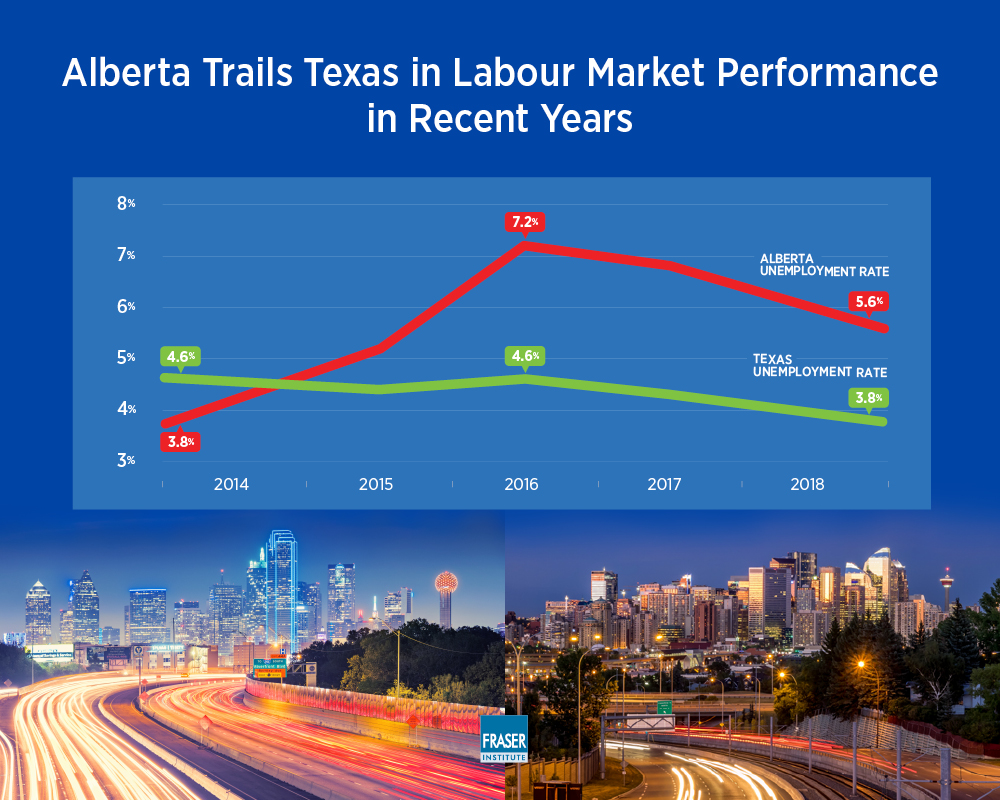Study
| EST. READ TIME 2 MIN.Since 2014, Alberta unemployment rate increases while Texas rate drops
Lessons from the Lone Star State: Comparing the Economic Performance of Alberta and Texas
Summary
- This bulletin compares the economic and fiscal performance of the Canadian province of Alberta and the American state of Texas in recent years and provides a brief discussion of how different policy choices may be contributing to the divergent outcomes observed.
- While Alberta suffered a steep recession starting in 2014 followed by a period of tepid economic recovery, Texas’s economy has performed substantially better, and has returned to strong economic growth and low unemployment.
- Despite the severe negative effects of the oil price downturn of 2014, Texas’s economy still grew in inflation-adjusted per-person terms in recent years, albeit at the slow annual average rate of 0.2 percent. By comparison, inflation-adjusted per person economic growth in Alberta was meaningfully negative at -2.4 percent annually.
- Employment growth has also been much stronger over the past three years in Texas than in Alberta, averaging 1.7 percent from 2015 to 2018 compared to 0.6 percent in Alberta.
- Weak economic performance in Alberta compared to strong results in Texas has contributed to very different fiscal outcomes in the two provinces. Alberta has consistently run large deficits and accumulated substantial debt, whereas Texas has not.
- While many factors have influenced the divergent economic outcomes between Alberta and Texas, it is noteworthy that during this period the two jurisdictions have taken markedly different approaches to public policy. In Alberta, spending-fueled deficits, increasing taxes, and the perception that its oil and gas investment climate has become unwelcoming have all, to varying extents, hindered Alberta’s ability to compete.

Share
-

Steve Lafleur
Steve Lafleur is a research director at the Institute for Research on Public Policy, a former senior fellow of theFraser Institute and a former senior policy analyst at the Fraser Institute. He holds an M.A. in Political Science from Wilfrid Laurier University and a B.A. from Laurentian University where he studied Political Science and Economics. He was previously a Senior Policy Analyst with the Frontier Centre for Public Policy in Winnipeg and is a Contributing Editor to New Geography. His past work has focused primarily on housing, transportation, local government and inter-governmental fiscal relations. His current focus is on economic competitiveness of jurisdictions in the Prairie provinces. His writing has appeared in every major national and regional Canadian newspaper and his work has been cited by many sources including the Partnership for a New American Economy and the Reason Foundation.… Read more Read Less… -

Milagros Palacios
Director, Addington Centre for Measurement, Fraser Institute
Milagros Palacios is the Director for the Addington Centre for Measurement at the Fraser Institute. She holds a B.S. in IndustrialEngineering from the Pontifical Catholic University of Peru and a M.Sc. in Economics from the University of Concepcion, Chile. Ms. Palacios has studied public policy involving taxation, government finances, investment, productivity, labour markets, and charitable giving, for nearly 10 years. Since joining the Institute, Ms. Palacios has authored or coauthored over 70 comprehensive research studies, 70 commentaries and four books. Her recent commentaries have appeared in major Canadian newspapers such as the National Post, Toronto Sun, Windsor Star, and Vancouver Sun.… Read more Read Less…
Related Topics
Related Articles
Federal government gets failing grade for fiscal transparency and accountability
By: Jake Fuss and Grady Munro
Alberta government’s AIMCo shakeup could mean government control of pension fund assets
By: Steven Globerman and Tegan Hill